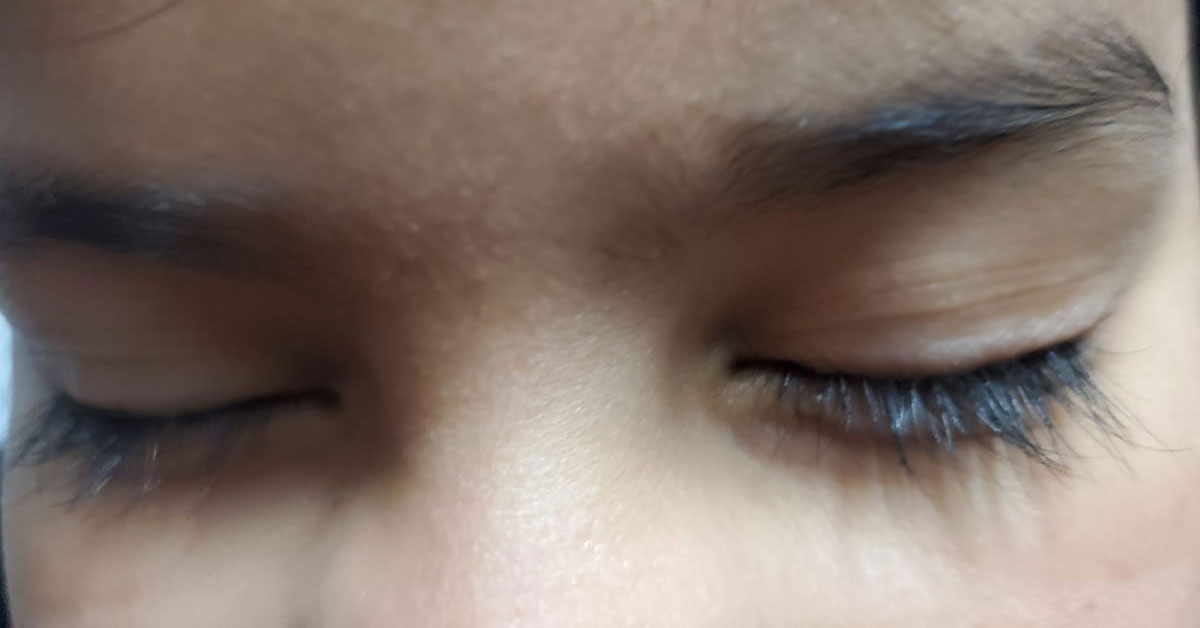Blinking is an involuntary reflex that occurs bilaterally up to 20 times a minute. Rapid, infrequent, or asymmetrical blinking is abnormal. The role that healthy functional eyes play in our lives is very difficult to define because it is so deeply personal and intimate. There are plenty of reasons which lead to an uncontrollable blinking of eyes, it can be due to some eye irritants, dry eyes, dust particles, allergies, infections. Emotional imbalances like excessive happiness, fear, anxiety, stress, fatigue, etc can lead to uncontrolled blinking of eyes. It is quite natural and occurs in each and everyone’s life at one or another point. When excessive blinking of eyes interferes with daily life activities and vision, it should be regarded as a problem and medical advice ought to be sought. Neurological factors ie, the problem with nerves that controls eyelid movements too can cause abnormal blink reflex of eyes. When abnormalities of the brain and nervous system are involved in the uncontrolled blink reflex of the eyes, it will be often associated with other signs and symptoms also.
Incidence rate
Uncontrolled blinking occurs both in adults and children. It is quite commonly seen in children than in adults. The incidence of uncontrolled blink reflex is higher in boys than girls.
What are the causes of excessive blinking of eyes?
The most common cause of uncontrolled blinking of the eye is due to dry eye syndrome. This is the way in which the eyes are telling you that they are thirsty. They need some more tears because with every blink, a new consignment of tears flows into your eyes and it nourishes the cornea. Does the cornea need nourishment by tears? Yes, it does need nourishment only
by tears because the cornea does not have any blood supply. Well, my friends, didn’t you always think that only when you cry, tears roll down? No. There is always a layer of tears in the eye which nourishes the cornea and whatever reason it might be, which causes a depletion of the tear film, your eyes need to blink again and again to see that your cornea gets nourished, because the cornea of the eye is the most important structure of the eye and a very important role it plays to give you clear vision. This being said, I would like to now say that there are other causes also of recurrent blinking of the eyes, for example, any allergy of the eyes or any irritant entering into your eyes because this is the only way in which the eye can get that out.
Physical factors
- Exposure to dust particles
- Dry eye syndrome
- Foreign particles in eyes
- Sudden exposure to bright light
- Fatigue and tiredness
- Foreign particles over the surface of the eyes
- Chemical splash into eyes
- Allergic eye disease (conjunctivitis)
- Injury or abrasion to eyelids
- Reading for a long time
- Using computer and television screen for a long time strains eyes
Refractive disorders
- Myopia –nearsightedness
- Hyperopia-farsightedness
Movement disorder
- Blepharospasm- A disease causing rapid involuntary blinking due to abnormal nervous stimulation.
- Meige syndrome- A neurological condition that involves contractions of muscles of jaw, tongue along with blepharospasm.
Psychological factors
- Stress
- Anxiety
- Fear
Neurological factors
- Wilson’s disease- A rare inherited disorder that causes copper to accumulate in the body without allowing its elimination. It leads to involuntary muscle movements.
- Multiple sclerosis- A potentially disabling disease of the brain and spinal cord
- Tourette syndrome- A disorder that involves repetitive movements. When muscle movement is around the eyes it causes excessive blinking of the eyes
- Seizures- Absence seizure or petit mal seizure is a type of seizure that causes a brief change in the state of consciousness and staring. Posture will be maintained well with mouth or face twitches or eyes may blink rapidly.
Tic disorder
- Sudden repetitive blinking of eyes is formed by a habit called a tic. Tics are formed by habits for eg, some people when they are stressed or anxious they blink their eyes repeatedly, and later on, it becomes a habit for them. Whenever they feel stressed or anxious they begin to blink their eyes, which has become a habit for them, formed by them.
Cause of excessive blinking of eyes among children
Parents get really worried when children complain that they are blinking very often. When an ophthalmologist does a thorough eye check-up they might not find any reason for their excessive blinking, then the commonest reason would be attention-seeking behavior. This child is feeling neglected. And he or she wants the attention of their parent. Well, then we need to talk about a deep psychological problem for which a counselor has to be enrolled. For some children who have a refractive error, that means they need to wear spectacles to see clearly, they come to consult an ophthalmologist with the complaint of excessive blinking. So when an eye examination of such children is done, it is found that they might need to wear glass, and soon as the correct refractive correction is made, in the form of spectacles, the blinking disappears.
How to find out why my eyes blink this way?
There are various methods to diagnose the exact cause of excessive blinking of eyes….
✓ A complete history collection which includes chief complaints, present and past medical and surgical history along with detailed family history and history of eye-related problems among family members and grandparents would be collected by the eye specialist.
✓ Questions would be asked about the blinking reflex of the eyes and its association with pain, discomfort, visual changes, swelling, redness, or drainage from the eye.
✓ Questions would also be asked about the time of the day and the season of the year during which manifestation occurs as well as about the sensitivity to light
Physical examination of eyes includes
➢ Assessment of external eye structures using inspection and palpation, extraocular movements, visual acuity, and visual fields.
➢ An eye specialist also will observe the client’s body structure and features for obvious deformities and age factors. For instance, a client with abnormal gait or deformities with arthritis may be a clue for the diagnosis of an associated eye disorder of dry eye syndrome in a client who reports excessive blinking of eyes, burning sensation, itching, etc.
➢ An ophthalmologist or an optometrist inspects and palpates the external eye structures while the client sits at the eye level (eyebrows, eyelashes, eyelids, lacrimal apparatus, conjunctiva, sclera, pupils, irises, etc)
➢ The corneal reflex is assessed to identify the function of the fifth cranial nerve which will provide an idea about the blinking response, which indicates the intactness of nerve function.
➢ Corneal light reflex test to determine eye alignment
➢ Cover-uncover test which assesses eye muscle function and confirms abnormal findings of strabismus.
➢ Visual acuity testing is done to rule out visual disturbances, refractive errors, and pathological processes.
➢ A slit lamp microscope is used to examine the anterior segment of the eye under magnification. Details of eyelid margins, lashes, conjunctiva, tear film, cornea, etc can be studied
What are the treatment options for uncontrollable blinking of eyes?
After conducting an in-depth assessment the eye specialist would be able to identify the exact cause of excessive blinking of eyes and the management will be based on the findings.
Treat the physical factors that lead to excessive blinking of eyes
❖ Treat dry eye syndrome with artificial tears (eye drops and lubricants), airtight goggles used at night to prevent tear evaporation. Estrogen replacement therapy in
some postmenopausal women have found some relief. In severe cases, surgery can be used to open lacrimal ducts or repair lid problems, and thus, excessive blinking of eyes as a result of dry eye syndrome subsides.
❖ Remove foreign particles, chemicals in the eyes that causes excessive blink reflex.
❖ Treat allergic eye diseases, injuries, etc with the consultation of an ophthalmologist.
❖ Avoid excessive straining of eyes with the use of television and computer screens
Treat refractive disorders to relieve uncontrolled blinking of eyes
❖ Correct refractive errors with corrective eyeglasses or contact lenses. Laser surgery and the use of corneal ring implants are the surgical approaches to correct refractive errors and thus, excessive blinking of eyes if caused by refractive disorders.
Treat movement disorders that lead to excessive blinking of eyes
❖ Blepharospasm and Meige syndrome can be reduced by weakening eye muscles with botox injections. Therefore, excessive blink reflex caused by movement disorder would be reduced.
Treat Psychological factors that lead to excessive blinking of eyes
❖ The paths to recovery from emotional disorder and a return to health are many. Successful treatment will likely involve a variety of strategies. It is important to remember that there is no magic pill to relieve stress, anxiety, fear, etc. consult a psychiatrist, psychotherapist team and give yourself time to consider your options, and try those things that best suit your personality and circumstances. As healing takes place, excessive blinking of eyes caused due to these factors get relieved.
Treat neurological factors that lead to excessive blinking of eyes
❖ Neurological diseases like Wilson’s disease, multiple sclerosis, Tourette syndrome, seizures should be treated with the consultation of a neurologist or neurosurgeon. Hence, the symptom of excessive blinking of eyes due to these disease condition subsides.
❖ Seizures- Absence seizure or petit mal seizure is a type of seizure that causes a brief change in the state of consciousness and staring. Posture will be maintained well with mouth or face twitches or eyes may blink rapidly.
Treat Tic disorder that leads to excessive blinking of eyes
❖ Sudden repetitive blinking of eyes formed by a habit sometimes gets relieved by its own. If this persists and hinders activities of daily living psychotherapies with the help of a therapist can be carried out and the disorder can be relieved or its intensity and severity reduced.
At times after doing an in-depth examination also the specialist might not identify the cause of the problem. Most of the time, excessive blinking of eyes subsides by itself and thus needs no treatment.
What can be done to prevent uncontrolled blinking of eyes?
Prevention of uncontrolled blinking of eyes can be done …..
- Avoid direct exposure to dust particles, smoke, and bright light including sunlight. Wear protective glasses or goggles while exposed.
- Do not rub eyes when a foreign particle enters into the eyes, wash hands thoroughly, and wash eyes with clean water.
- Avoid straining eyes too much by watching television and computer screen continuously for a long period.
- When excessive blinking of eyes becomes problematic never hesitate to consult an eye specialist. Rule out the cause of the problem with the consultation of an ophthalmologist and follow the treatment regimen as prescribed.
- Practice eye relaxation techniques
- Practice relaxation techniques like meditation, music therapy, engaging in hobbies, etc to provide relaxation to the body and mind.
- Never try self remedial measures for excessive blinking of eyes and avoid using any eyedrops and medications without the prescription of a physician.
- Periodic regular eye check-ups by consulting an ophthalmologist once a year would be effective in ruling out any eye-related problems and thus can be managed promptly.




